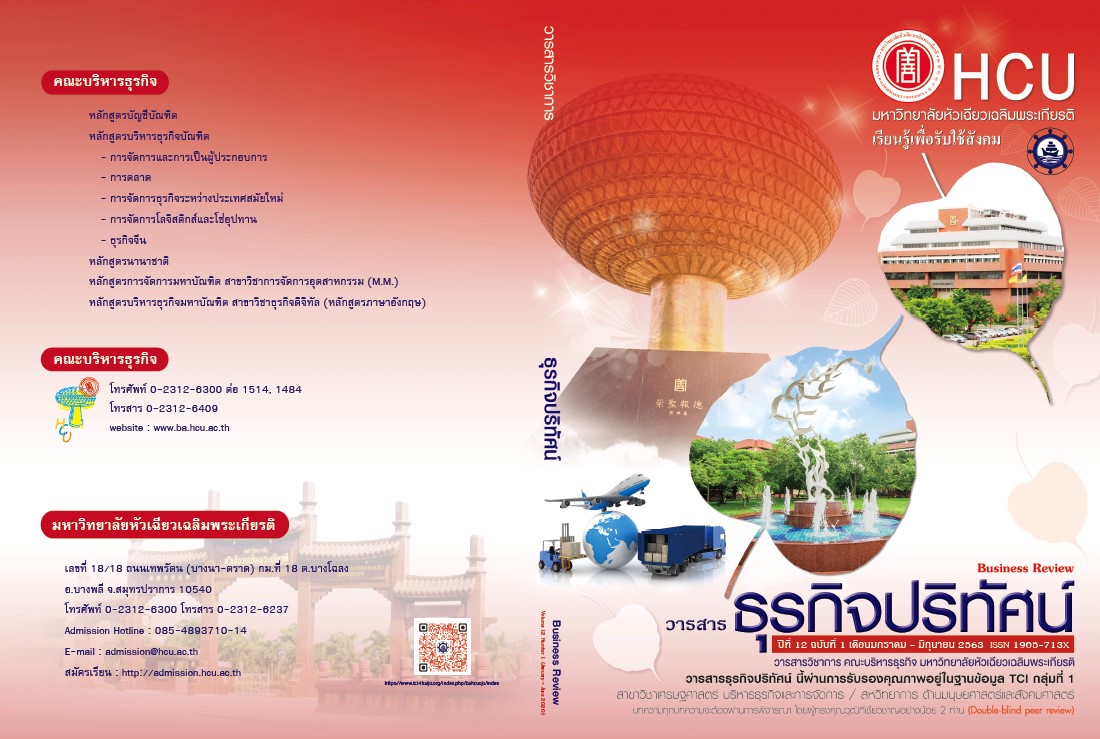Halal Kitchen Hoteland Its Opportunities in the Muslim Tourist Market
Keywords:
Service marketing mix, Muslim tourists, Halal kitchen hotelsAbstract
Muslim tourist is considered a large and growing tourist market. Providing Halal hotel services to accommodate Muslim tourist is an indispensable element of business in the tourism industry.This research aims to examine the understanding about Halal kitchen hotel, its service marketing mix, obstacles and trends. In-depth interview was used to collect the information from 15 stakeholders in 8 types of businesses in Halal tourism industry. The results indicated that, in Thailand context, there is no full-fledge Halal hotel which conform to Islamic law. However, there are 2 hotels with halal kitchen or Muslim friendly hotel. Moreover, service marketing mix that follow the Islamic principles will make Muslim tourists satisfied. For the Muslim tourism market, there is a growing trend from ASEAN countries and China. The main obstacles faced by Halal kitchen hotels were the lack of Muslim staffs and Muslim professional managers. Finally, Halal kitchen hotel with good management will gain more competitive advantage in the growing Muslim tourist market.
References
กันยปริณ ทองสามสี เอมอร เจียรมาศ อิสระ ทองสามสี ณัฏฐ์ หลักชัยกุล เพ็ญพักตร์ ทองแท้ และศรัณยา บุนนาค. (2561). ความต้องการรับบริการด้านที่พักของนักท่องเที่ยวมุสลิม. วารสารมหาวิทยาลัยศิลปากร, 38(3), หน้า 127-147.
ธรรมจักร เล็กบรรจง (2558). ปัจจัยส่วนประสมทางการตลาด 7Ps ที่มีผลต่อการตัดสินใจเลือกใช้บริการโรงแรมฮาลาลของนักท่องเที่ยวมุสลิมชาวไทยในจังหวัดภูเก็ต. วิทยาศาสตรมหาบัณฑิต สาขาวิทยาศาสตร์การกีฬา, จุฬาลงกรณ์มหาวิทยาลัย.
ปาริชาติ เบ็ญฤทธิ์ และสุขุมวิทย์ ไสยโสภณ. (2561). การบริหารจัดการโรงแรมฮาลาลไทย กรณีศึกษาโรงแรมในจังหวัดปัตตานี. วารสารการบริการและการท่องเที่ยวไทย, 13(2) หน้า 66-77.
สมาคมนักเรียนเก่าอาหรับประเทศไทย. (ม.ป.ป.) พระมหาคัมภีร์อัลกุรอานพร้อมความหมายภาษาไทย. นครมะดีนะฮ์: ศูนย์กษัตริย์ฟะฮัดเพื่อการพิมพ์อัลกุรอาน.
อรพรรณ จันทร์อินทร์ เพียงพิศ ศรีประเสริฐ และจิราภา ชาลาธราวัฒน์. (2556). การพัฒนาศักยภาพการท่องเที่ยวฮาลาลฝั่งทะเลอันดามันของประเทศไทยสำหรับนักท่องเที่ยวกลุ่มประเทศมุสลิม. กรุงเทพฯ: สำนักงานกองทุนสนับสนุนการวิจัย
Borzooei, M.,&Asgari, M. (2013). Halal branding and purchase intention: a brand personality appeal perspective.International Journal of Business and Management Invention, 2(8), 23-27.
Gracia, E., Bakker, A.B.,& Grau, R.M. (2011). Positive emotions: The connection betweenCustomer quality evaluations and loyalty. Cornell Hospitality Quarterly, 52 (4), 458-465.
Grim, B.J.,& Karim, M.S.(2011). The future of the global Muslim population: projections for 2010-2030. Washington DC: Pew Research Center.
Henderson, J. C. (2010). Sharia-compliant hotels. Tourism and Hospitality Research, 10(3), 246.
Isfahani, A. N., Pourezzat, A. A., Abdolmanafi, S., &Shahnazari, A. (2013). To Investigate influential factors on halal brand in the global market. Journal of Basic and Applied Scientific Research,3(1), 958-963.
Khraim, H. (2000). Measuring religiosity in consumer research from Islamic perspective. International Journal of Marketing Studies, 2(2), 166-179.
Liang, L. (2008). The determining factors of customer loyalty for luxury hotels in US. TheJournal of International Management Studies, 3(2), 167-175.
Mokhlis, S. (2009). Relevancy and measurement of religiosity in consumer behavior research. International of Business Research, 9, 175-179.
Nikhashemi, S.R., Paim, L.H.,&Khatibi, A. (2015). The role of brand loyalty in generating positive word of mouth among malaysian hypermarket customers. International Journal of Economics and Management Engineering, 9(5), 1647-1652.
Pong, J. L. T., &Yee, E. T. P. (2001). An integrated model of service loyalty. Retrieved May 30, 2009, from CiteSeerx Website: http://citeseerx.ist.psu.edu/viewdoc/download?doi= 10.1.1.199.1430&rep=rep1&type=pdf
Razalli, M. R., Yusoff, R. Z., &Roslan, M. W. M. (2013). A framework of halal certificationpractices for hotel industry. Asian Social Science, 9(11), 316.
Ramli, N. (2009). Halal Tourism: The Way Forward. Retrieved May 27, 2019, from Salaam Gateway Website: https://repository.salaamgateway.com/images/iep/galleries/ documents/201509120653414951.pdf
Rosenberg, P., &Choufany, H. M. (2009). Spiritual lodging–The Sharia-compliant hotelconcept. Dubai: HVS Global Hospitality Services.
Salleh, N. Z. M., Hamid, A. B. A., Hashim, N. H., &Omain, S. Z. (2014). The Practice of Shariah-Compliant Hotel in Malaysia. International Journal of Trade, Economics and Finance, 5(1), 26.
Samori, Z.,&Rahman, F.A., (2013). Towards the formation of Shariah complaint hotel in Malaysia: An exploratory study on its opportunities and challenges. WEI International Academic Conference on Business, Education and Social Sciences, 16-19June, 2013 Istanbul, Turkey.West Chester: The West East Institute.
Shahbandeh, M. (2018). Global market value of halal food 2017-2023. Retrieved June 5, 2019, from Statista Website: https://www.statista.com/statistics/562857/market-value-of-halal-product-worldwide/
Zailani, S., Omar, A., &Kopong, S. (2011). An Exploratory Study on the Factors Influencing the Non-Compliance to Halal among Hoteliers in Malaysia. International Business Management, 5(1), 1-12.
Downloads
Published
How to Cite
Issue
Section
License
All articles published in the Business Administration and Management Journal Review are copyrighted by the journal.
The views and opinions expressed in each article are solely those of the individual authors and do not represent those of Huachiew Chalermprakiet University or any other faculty members. Each author is fully responsible for the content of their own article. Any errors or issues found are the sole responsibility of the respective author.




